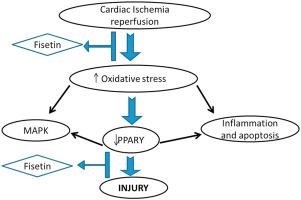Archives of Biochemistry and Biophysics ( IF 3.8 ) Pub Date : 2020-09-12 , DOI: 10.1016/j.abb.2020.108572 Shanky Garg 1 , Sana Irfan Khan 1 , Rajiv Kumar Malhotra 1 , Manish Kumar Sharma 2 , Manoj Kumar 3 , Punit Kaur 3 , Tapas Chandra Nag 2 , RumaRay 4 , Jagriti Bhatia 1 , Dharamvir Singh Arya 1

|
The methodology exploring the cardioprotective potential of the flavonoid Fisetin through its ability to modulate PPAR-γ was unraveled in the present study. Computational modelling through molecular docking based binding study of interactions between Fiestin and PPAR-γ revealed the potential role of Fisetin as an agonist of PPAR-γ. A murine model of cardiac ischemia-reperfusion injury was used to explore this further. Male Wistar Rats were randomly assigned to five groups. Fisetin (20 mg/kg; p. o) was administered for 28 days. Ischemia was induced for 45 min on the 29th day followed by 60 min of reperfusion. Fisetin pretreatment upregulated the expression of PPAR-γ in heart tissue significantly Cardioprotection was assessed by measurement of hemodynamic parameters, infarct size, ELISA for oxidative stress, immunohistochemistry and TUNEL assay for apoptosis, and western blot analysis for MAPK proteins and inflammation. PPAR-γ activation by fisetin led to significantly reduced infarct size, suppression of oxidative stress, reduction of cardiac injury markers, alleviation of inflammation, and inhibition of apoptosis The MAPK-based molecular mechanism showed a rise in a key prosurvival kinase, ERK1/ERK2 and suppression of JNK and p38 proteins. The aforementioned beneficial findings of fisetin were reversed on the administration of a specific antagonist of PPAR-γ. In conclusion, through our experiments, we have proved that fisetin protects the heart against ischemia-reperfusion injury and the evident cardioprotection is PPAR-γ dependant. In conclusion, our study has revealed a prime mechanism involved in the cardioprotective effects of fisetin. Hence, Fisetin may be evaluated in further clinical studies as a cardioprotective agent in patients undergoing reperfusion interventions.
中文翻译:

在心肌梗塞的小鼠模型中,饮食类黄酮类非瑟酮作为PPAR-γ的激动剂参与心脏保护的分子机制。
本研究未阐明通过黄酮类非瑟酮调节PPAR-γ的能力来研究其心脏保护作用的方法。Fiestin与PPAR-γ之间相互作用的基于分子对接的结合研究的计算模型揭示了Fisetin作为PPAR-γ激动剂的潜在作用。心脏缺血-再灌注损伤的小鼠模型用于进一步研究。将雄性Wistar大鼠随机分为五组。给予Fisetin(20 mg / kg;口服)28天。在第29天诱导缺血45分钟,然后再灌注60分钟。Fisetin预处理显着上调了心脏组织中PPAR-γ的表达,通过测量血流动力学参数,梗死面积,ELISA氧化应激评估了心脏保护作用,免疫组织化学和TUNEL法检测细胞凋亡,Western blot分析MAPK蛋白和炎症。Fisetin激活PPAR-γ导致梗塞面积明显减少,氧化应激抑制,心脏损伤标记物减少,炎症减轻和凋亡抑制基于MAPK的分子机制表明关键的生存激酶ERK1 / ERK2升高和抑制JNK和p38蛋白。非瑟定的上述有益发现在给予PPAR-γ特异性拮抗剂后被逆转。总之,通过我们的实验,我们证明了非瑟定可以保护心脏免受缺血再灌注损伤,并且明显的心脏保护作用依赖于PPAR-γ。总之,我们的研究揭示了与非瑟定心脏保护作用有关的主要机制。因此,









































 京公网安备 11010802027423号
京公网安备 11010802027423号